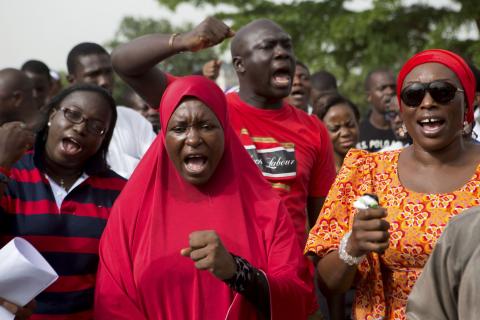Advertisement
Nigeria President Optimistic Over Finding Abducted Schoolgirls
ABUJA (Reuters) - Nigerian President Goodluck Jonathan said on Sunday international military and intelligence assistance made him optimistic about finding 200 schoolgirls abducted last month by Islamic militants in an attack condemned globally.
Israel became the latest country to offer help to Nigeria since April 14 when militants from Boko Haram stormed a secondary school in the northeastern village of Chibok and seized 276 girls who were taking exams. Some managed to escape but around 200 remain missing.
Prime Minister Benjamin Netanyahu's office gave no details of its proposed assistance but Jonathan said Netanyahu offered during a phone conversation to send a team of counter-terrorism experts.
The United States and Britain have flown in experts and this, coupled with the deployment by Nigeria of two army divisions to the border region, signals that the search effort is gathering pace.
But it comes against a backdrop of sharp criticism of Jonathan's government for responding too slowly to the crisis.
"Nigeria would be pleased to have Israel's globally acknowledged anti-terrorism expertise deployed to support its ongoing operations," said a statement from State House in Abuja.
Jonathan is "very optimistic that with the entire international community deploying its considerable military and intelligence-gathering skills and assets in support of Nigeria's efforts ... success will soon be achieved," it said.
Outrage over the attack has focused attention on Boko Haram, a group that has destabilized parts of northeast Nigeria and killed thousands since 2009 in its fight for an Islamist state.
French President Francois Hollande on Sunday offered to host a summit in Paris next Saturday with Nigeria and its neighbors focused on the militant group.
"With Nigerian President Goodluck Jonathan, I have proposed to hold a meeting with the countries bordering Nigeria," Hollande said during a visit to the Azeri capital, Baku.
The leaders of Benin, Cameroon, Chad and Niger might also attend and Britain, the European Union and the United States would likely be represented as well, Hollande's aides said.
A campaign on social media using the Twitter hashtag #BringBackOurGirls has stoked concern over the kidnappings, which have touched a chord because of the vulnerability of the girls and the brutality of the attackers.
Boko Haram leader Abubakar Shekau this month threatened to sell the girls "in the market", deepening concern about their fate.
U.S. first lady Michelle Obama on Saturday called the attack an "unconscionable act".
Around 100 people protested in Unity Park in central Abuja on Sunday over the girls, chanting: "Bring back our girls now and alive." Scores of police watched the rally in a city that has seen dozens killed in two attacks in the last month.
"The government might see it (this protest) as an embarrassment but we have the right to gather. This is not about painting Africa in a bad light," Rotimi Ozawale, a spokesman for daily protests, told Reuters.
(Additional reporting by Felix Onuah in Abuja, Dan Williams in Jerusalem and Elizabeth Pineau in Baku; Editing by Sandra Maler)



















Add new comment